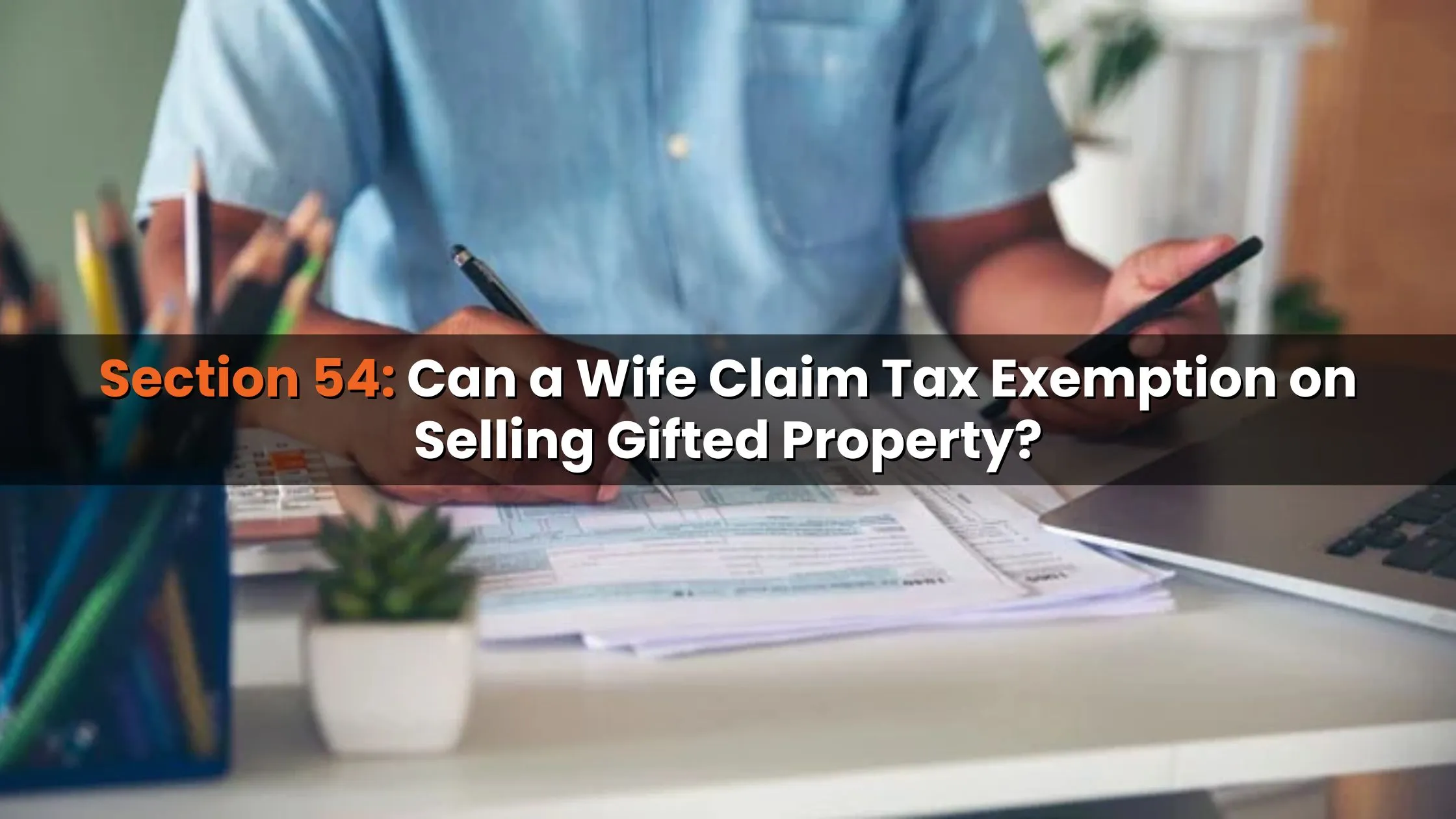Table of Content
▲- What is Section 54 of the Income Tax Act?
- Can a Wife Claim Section 54 Exemption on Property Gifted by Her Husband?
- ITAT Mumbai Ruling: A Landmark 2025 Judgment
- Additional Rulings That Support Section 54 Flexibility
- Legal Essentials to Claim Section 54 in Intra-Family Transfers
- What Tax Experts Say About Section 54 and Spousal Transactions
- Final Thoughts:
When my husband and I first began planning our real estate investments, I stumbled across a tricky but important question: Can I claim capital gains exemption under Section 54 if I sell property gifted by him and reinvest the proceeds in another home?
It seemed like a grey area, especially with tax rules around intra-family transfers and clubbing provisions. But after digging through recent judgments and expert opinions, I found some much-needed clarity and a powerful legal precedent that every taxpayer should know.
In this blog, I’ll break down how Section 54 works, what the Income Tax Appellate Tribunal (ITAT) ruled in a landmark 2025 judgment, and whether a wife can legally claim tax exemption after selling flats gifted by her husband. If you’re navigating real estate planning within your family, this article is for you.
What is Section 54 of the Income Tax Act?
Before diving into family transactions, let’s understand what Section 54 actually allows.
Section 54 of the Income Tax Act, 1961, provides an exemption from long-term capital gains tax if the proceeds from the sale of a residential property are reinvested in another residential house. But there are some critical conditions:
- The original property must be a long-term capital asset held for more than 2 years.
- The new residential house must be:
- Purchased within 1 year before or 2 years after the sale, or
- Constructed within 3 years of the sale.
- The exemption is available only for individuals and HUFs.
- The reinvestment must be in India.
- As per the 2023 amendment, the maximum exemption allowed under Section 54 is ₹10 crore.
If all these conditions are met, the capital gains tax liability is reduced or eliminated offering a powerful planning tool for property owners.
Also Read: Buying an Under-Construction Property? Know the Tripartite Agreement
Can a Wife Claim Section 54 Exemption on Property Gifted by Her Husband?
This was the core of my query: If my husband gifts flats to me via a registered gift deed, and I sell them and reinvest the gains into a new home can I legally claim the Section 54 exemption?
The answer is yes but only if certain legal and financial conditions are fulfilled.
Gifts between spouses are not taxable, and once the asset is transferred through a valid gift deed, the donee (wife) becomes the absolute legal owner. This allows her to sell the property in her name and claim exemption under Section 54 on the capital gains arising in her hands.
However, the key is that the gift should not be a mere book entry or a method to evade taxes. The transaction must reflect a genuine transfer of ownership, and the reinvestment must also be legitimate.
In simpler terms: If the transfer is legal, the sale is genuine, and the reinvestment is properly executed, Section 54 exemption is valid even if the new property is purchased from a relative like a spouse.
ITAT Mumbai Ruling: A Landmark 2025 Judgment
The turning point for me came in June 2025, when the Mumbai Income Tax Appellate Tribunal (ITAT) ruled in favor of a woman taxpayer in a strikingly similar case.
Case Summary:
- The assessee received two flats as a gift from her husband via a registered deed.
- She later sold both flats in 2020 for approximately ₹6 crore.
- She reinvested ₹3.85 crore into a new residential house purchased from her husband.
- The Assessing Officer denied the Section 54 exemption, alleging:
- Circular transactions
- No real transfer of income
- Application of clubbing provisions under Section 64
But the Tribunal had a different view.
Tribunal Verdict:
- The gift deed was valid and registered.
- The wife was the legal and beneficial owner of the flats at the time of sale.
- The reinvestment into a new home met all conditions of Section 54.
- There was no misuse or circularity funds were traceable and the purchase was legitimate.
As a result, the ITAT upheld the exemption under Section 54, setting a clear precedent for genuine family transfers.
Additional Rulings That Support Section 54 Flexibility
This wasn't an isolated case. Several other judgments by tax authorities and courts have upheld the flexible and inclusive application of Section 54, especially when taxpayers act in good faith.
1. CIT vs. Kamal Wahal (2013, Delhi HC)
The Delhi High Court ruled that even if a new residential house is purchased in the name of a spouse, the taxpayer can still claim Section 54 exemption, provided the entire capital gain amount has been reinvested by the assessee.
2. ITO vs. Smt. Rekha Shetty (ITAT Bangalore, 2013)
In this case, the tribunal held that Section 54 does not mandate that the new property must be in the same name as the person who sold the original asset, as long as the investment and ownership details are genuine.
3. K.C. Gopalan vs. CIT (Kerala HC)
The High Court emphasized that Section 54 is a beneficial provision and must be interpreted in a liberal manner. Even if a property is bought before the date of transfer, as long as it’s within the allowed timeline, exemption is permitted.
These rulings show that courts across the country consistently uphold the spirit of reinvestment over rigid technicalities, as long as the transactions are genuine and well-supported.
Legal Essentials to Claim Section 54 in Intra-Family Transfers
From these rulings and expert commentary, I’ve distilled the five key legal essentials to claim exemption under Section 54 in family-based transactions:
- Registered Gift Deed Is Non-Negotiable
- Actual Ownership Must Be Proven
- Genuine Reinvestment
- Avoid Circular Money Flow
- Clubbing Provisions Don’t Apply If Ownership Is Genuine
Also Read: Understanding Index 2 Document in Property Registration: Format, Uses, and Retrieval
What Tax Experts Say About Section 54 and Spousal Transactions
According to Kunal Savani, Partner at Cyril Amarchand Mangaldas:
“The ITAT ruling reaffirms that exemption under Section 54 can be claimed even when reinvestment is made in a property purchased from a relative, such as a spouse provided the transaction is genuine, and the documentation and financial trail are in order.”
Other tax professionals agree that substance, not merely form, should drive the decision. If you’re reinvesting capital gains from a valid sale, the relationship between buyer and seller does not automatically disqualify you from Section 54 benefits.
Final Thoughts:
This experience taught me that Section 54 is far more robust than many assume. Yes, tax rules around gifts and clubbing can seem intimidating but when the transaction is clean, compliant, and transparent, even intra-family deals can qualify for full exemption.
If you’re planning to sell property received as a gift and reinvest in a new home, do it by the book:
- Follow timelines
- Document everything
- Use banking channels
- Consult a professional if needed
Section 54 offers a powerful tax break but like all good things in tax law, it comes with responsibility. Handle it right, and you can plan smart, save tax, and build wealth just like I did.
Follow AquireAcers Whatsapp Channel to Stay Updated With The Latest Real Estate News






_1771410929.webp)


Ans 1. Yes, if the property was transferred through a registered gift deed, the wife becomes the legal owner. Upon selling it, she can claim Section 54 exemption if all reinvestment conditions are met.
Ans 2. No, gifts between spouses are exempt from tax. However, the donee must prove actual ownership and genuine reinvestment for Section 54 benefits to apply.
Ans 3. The property must be a long-term capital asset, and the gains must be reinvested in a residential house in India within the specified time frame 1 year before, or 2 years after the sale (3 years if constructed).
Ans 4. Yes, as confirmed by the 2025 ITAT ruling, if the transaction is genuine and well-documented, purchasing the new home from a spouse does not invalidate the exemption.
Ans 5. The Tribunal upheld Section 54 exemption for a woman who sold gifted flats and reinvested the gains in a house purchased from her husband, citing legal ownership and transparent transactions.
Ans 6. No, clubbing provisions don’t apply if the gifted property is legally transferred, and the sale and reinvestment are genuine. The income is then taxed in the hands of the wife.
Ans 7. An unregistered gift may not be considered valid for tax and ownership purposes, weakening the Section 54 claim. A registered deed is essential for legal clarity.
Ans 8. Yes, as per past rulings like Kamal Wahal and Rekha Shetty, courts have allowed Section 54 benefits if the investment is genuine, even if the new home is in a spouse’s name.